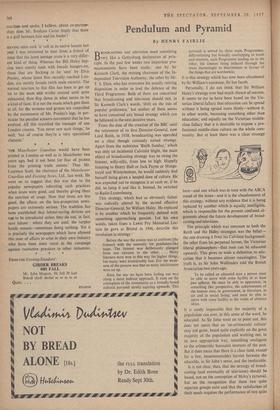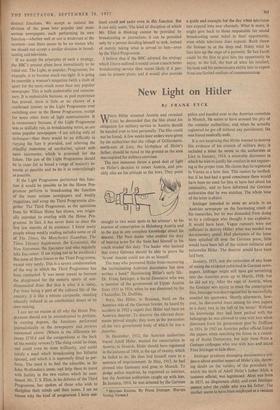Pendulum and Pyramid
By HENRY FAIRLIE EROADCASTING and television need something very like a Gettysburg declaration of prin- ciple. In the past few weeks two important pro- nouncements have been made: one by Sir Kenneth Clark, the retiring chairman of the In- dependent Television Authority; the other by Mr. T. S. Eliot, who has overcome his usually retiring disposition in order to lead the defence of the Third Programme. Both of them are concerned that broadcasting and television should not, in Sir Kenneth Clark's words, 'drift on the tide of popular preference,' but neither of them seems to have conceived any broad strategy which can be followed in the next decisive years.
From the date of the creation of the BBC until the retirement of its first Director-General, now Lord Reith, in 1938, broadcasting was operated on a clear though curiously mixed strategy. Apart from the notorious `Reith Sunday,' which was only an incidental Calvinist blight, the main object of broadcasting strategy was to swing the listener, willy-nilly, from low to high. Happily listening to Henry Hall or Jack Payne or Murga- troyd and Winterbottom, he would suddenly find himself being given a heaped dose of culture. He was expected not to recognise it as such or, if he did, to lump it and like it. Instead, he switched to Radio Luxembourg.
This strategy, which had so obviously failed, was radically altered by the second effective Director-General, Sir William Haley. He replaced it by another which he frequently defined with something approaching passion. Let his own words, taken from a Lewis Fry Memorial Lec- ture he gave at Bristol in 1946, describe this revolution in strategy : Before the war the system was to confront [the listener] with the necessity for pendulum-like leaps. The listener was deliberately plunged from one extreme to the other. . . . Many listeners were won in this way for higher things, but many were irretrievably lost. For the weak- ness of the process was that so many intolerances were set up.
Since the war we have been feeling our way along a more indirect approach. It rests on the conception of the community as a broadly based cultural pyramid slowly aspiring upwards. This pyramid is served by three main Programmes, differentiating but broadly overlapping in levels and interests, each Programme leading on to the
other, the listener being induced through the years increasingly to discriminate in favour of
the things that are worthwhile.
It is this strategy which has now been abandoned by Sir William's successor, Sir Ian Jacob.
Personally, I do not think that Sir William Haley's strategy ever had much chance of success. It seems to me to have been based on the Vic- torian liberal fallacy that education can be spread without it being spread more thinly—without it, in other words, becoming something other than education; and equally on *the Victorian middle- class fallacy that it is desirable to impose a pro- fessional middle-class culture on the whole com- munity. But at least there was a clear strategy here—and one which was in tune with the ABCA mood of the times—and it is the abandonment of this strategy, without any evidence that it is being replaced by another which is equally intelligible, which is responsible for the present confused ar- guments about the future development of broad- casting and television.
The principle which was common to both the Reith and the Haley strategies was the belief— the one drawing it from his Calvinist background; the other from his perpetual heroes, the Victorian liberal philosophers—that men can be educated upwards. This gives so wide a definition to edu- cation that it becomes almost meaningless. The truth is, as Sir John Wolfenden told the British Association two years ago, To be called an educated man a person must be able to move with some facility in at least two spheres. He must be able to appreciate, in something like perspective, the achievements of the human race, in government, in literature, in art and in social living; and must be able to move with some facility in the realm of abstract ideas.
It is surely impossible that the majority of a population can ever, in this sense of the word, be educated. As Sir John went on to point out, this does not mean that an `un-aristocratic culture' may not grow, based quite explicitly on the great majority of the population and working out, in its own appropriate way, something analagous to the aristocratic humanist interests of the past. But it does mean that there is a clear (and, except for a few, insurmountable) barrier between the educable, in Sir John's sense, and the ineducable.
Is it not clear, then, that the strategy of broad- casting (and eventually of television) should be based, not on the conception of Haley's pyramid, but on the recognition that these two quite separate groups exist and that the satisfaction of their needs requires the performance of two quite distinct functions. We accept as natural the division of the press into popular and more serious newspapers, each performing its own function—whether well or not is irrelevant at the moment—and there seems to be no reason why we should not accept a similar division in broad- casting and television.
If we accept the principles of such a strategy, the BBC's present plans have immediately to be ruled out. The Light, or popular, Programme, for example, is to become much too light. It is going to resemble a woman's magazine (with a dash of sport for the men) much more than any popular newspaper. This is both undesirable and unneces- sary. It is undesirable because, as past experience has proved, there is little or no chance of a confirmed listener to the Light Programme ever switching over to the Home Programme, except for some other form of light entertainment. It is unnecessary because, if the Light Programme was as skilfully run, in broadcasting terms, as are some popular newspapers—I am talking only of technique—then there would be no difficulty in varying the fare it provided, and relieving the dreadful monotony of saccharine, spiced with news summaries, which is promised for the future. The aim of the Light Programme should be to cater for as broad a range of majority in- terests as possible and to do it as entertainingly as possible.
If the Light Programme performed this func- tion it would be possible to let the Home Pro- gramme perform in broadcasting the function of the more serious newspapers and weekly magazines, and scrap the Third Programme alto- gether. The Third Programme, as the quotation from Sir William Haley has shown, was origin- ally intended to overlap with the Home Pro- gramme. In fact, it has never done so since the first few months of its existence. 1 know many people whose weekly reading includes some or all of The Times, the Manchester Guardian, The Times Literary Supplement, the Economist, the New Statesman, the Spectator and who regularly take Encounter. (1 am trying not to be invidious.) But none of them listens to the Third Programme, except very rarely. This is a severe condemnation of the way in which the Third Programme has been conducted. It was never meant to become the playground for the esoteric sports of one- dimensional dons. But that is what it is today. Far from being a part of the cultural life of the country, it is like a remote campanile, standing absurdly isolated in an uninhabited desert of its own making.
I can see no reason at all why the Home Pro- gramme should not 4e reconstructed to perform, in varying degrees, the functions performed journalistically in the newspapers and reviews mentioned above. (Where is the difference be- tween /TM/1 and the competitions at the back of the weekly reviews?) The thing could be done, and could even be done brilliantly, and could satisfy a need which broadcasting has hitherto ignored, and which it is supremely fitted to per- form. The need is to find the educable, in Sir John Wolfenden's sense, and help them to move with facility in the two realms which he men- tioned. Mr. T. S. Eliot, in his defence of the Third Programme, has spoken of those who wish to discipline their minds and their tastes. I see no reason why the kind of programme I have out-
lined could not assist even in this function. But it can only assist. The kind of discipline of which Mr. Eliot is thinking cannot be provided by broadcasting or journalism; it can be provided only by a person deciding himself to seek, instead of merely taking what is served to him—even by the Third Programme.
I believe that if the BBC adopted the strategy which I have outlined it would create aMuch better broadcasting service than seems likely if it pur- sues its present plans, and it would also provide a guide and example for the day when television can expand into new channels. What is more, it might give back to those responsible for sound broadcasting some belief in their opportunity, even while television does expand. Reith threw the listener in at the deep end. Haley tried to lure him up the steps of a pyramid. Sir Ian Jacob could be the first to give him the opportunity to enjoy, to the full, the best of what his intellect, his taste and his perseverance entitle him to expect from one limited medium of communication.































 Previous page
Previous page